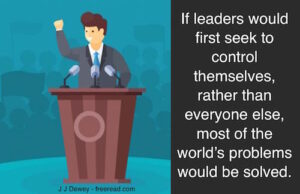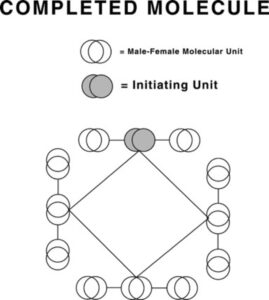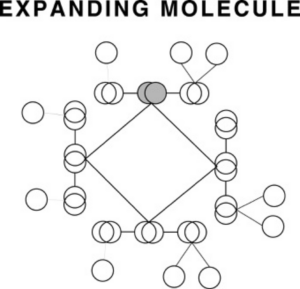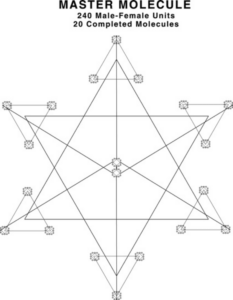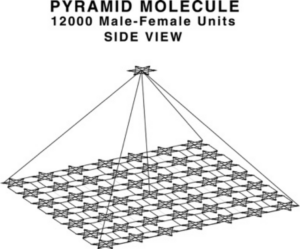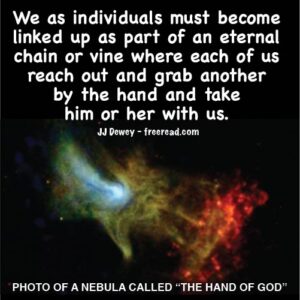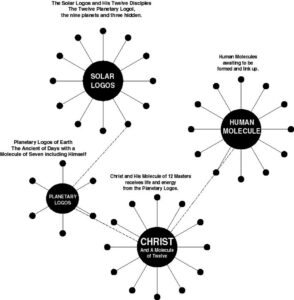
Chapter Twenty-Four
The Human Molecule
One can only wonder at the manifested properties of a Human Molecule. Water is so much different than either hydrogen or oxygen. How could a group of molecular humans be different than human, or greater than human? Would they be supermen and women, or Gods, or what?
If we think about it, we do not have to look to the future to see the power of a human Molecule, but to the past. There have been several attempts to create such a group, but by far the best known was initiated by Jesus.
Just as an atomic Molecule has to have a certain number of atoms in it to work, so does the human; the number that Jesus used, for example, was twelve units. However, we must not overlook an important principle: each human atomic unit is composed of not just one man or one woman, but a male and female united. The Bible does not tell us specifically that each of the apostles had a female partner, but neither does it say that they did not. It does concretely say that Peter had a wife (See Matt 8:14).
The New Testament clearly tells us that there was a large company of women who followed Jesus and the apostles. It was these women who first witnessed the resurrection and related it to the disciples: “It was Mary Magdalene and Joanna, and Mary the mother of James and other women that were with them, which told these things unto the apostles.” Luke 24:10
The only men specifically mentioned that were with Jesus were the twelve. It seems logical that a number of these women who followed them were wives, or companions, to the twelve.
If each of the twelve had a female partner, this would make the actual number in the Molecule of Jesus twenty-four. Ironically, this is the number of entities in the Molecule before the throne of God: “And round about the throne (of God) were FOUR AND TWENTY seats: and upon the seats I saw four and twenty elders sitting, clothed in white raiment; and they had on their heads crowns of gold.” Rev. 4:4
Because the entities were called Elders does not mean they were male or had a certain position in the church of God. “Elder” comes from the word PRESBUTEROS which means “Elder one.” In other words, the twenty-four entities before the throne of God were very evolved and ancient Souls having the experience of many lifetimes.
In the marriage relationship, Jesus said that the male and female “are no more twain, but one flesh.” Matt 19:6. Therefore, one human Adam or Atom is male and female united. The Molecule of Jesus was thus called the “twelve” rather than the twenty-four.
In the human Molecule, the female is polarized in the energy of magnetism or receivership. The male is in radiance or is sending. Remember, we all have both energies within us, but we are guided by our Soul to manifest the energy represented by our physical body (male or female).
The male energy of radiant action is not more important than the female, but it is more visible and generally receives more credit. This should not be the case, however, for without the female energy of magnetism, there would be no power to draw energy into form and maintain it there.
The ancients recognized and appreciated this principle. That is why their deities were female. They recognized that no form could manifest without the female energy.
In the Molecule of Jesus, the men performed the recorded miracles, but the women had the magnetic force to draw the spiritual energy so the miracles were possible.
It is interesting that the first recorded miracle of Jesus was at a marriage feast. What is even more interesting is the fact that Mary, the mother of Jesus, was responsible for the guests and Jesus was instructed by his mother that they needed more wine. Why was Mary presiding at the wedding if she were not the mother of the groom (which was the custom at that time), and why was Jesus responsible for more wine if he was not the groom? Did he pull from the magnetic energy of his female mother and his bride to perform his first miracle of changing the water into wine? Read John 2:1-11 and ask yourself. Even if we discount the idea that this was Jesus’ marriage we still see female energy at play in the request made by His mother.
At the time of the greatest miracle of them all, the resurrection from the dead, who was the first person that Jesus appeared to? Was it Peter, who was to be the head of the church?
No.
It was Mary Magdalene.
Not only was Mary Magdalene there to see the miracle of the resurrection before any man, but so were “Joanna, and Mary the mother of James, and other women…” Luke 24:10 Is it possible that for His greatest miracle, Jesus actually needed to surround Himself with the magnetic power of numerous females?
When he performed his second greatest miracle of raising Lazareth from the dead, he drew from the faith of Mary and Martha who were present. Martha said to him: “I know, that even now (that Lazareth is dead), whatsoever thou wilt ask of God, God will give it thee.” John 11:22
Martha here believed in something that had never been done before: that a man whose body was in decay could be raised from the dead. None of the apostles believed in Jesus the way the women did. The question is: Could Jesus have even performed the great miracles without the magnetic belief of the females around him? Was this the reason that just before he gave the command for Lazareth to rise, he asked Martha if she believed on him?
The male apostles did not believe that Jesus was going to rise from the dead, but numerous women did. They were waiting at the grave for him when he arose because they believed that he could conquer even death as he had told them.
The fact is simply this: without the synthesis of male radiant energy and female magnetic energy there can be no creation. On the other hand, by the power of the cooperation of the two energies, there is no creation that can be withheld. Yea, even the miracle of the resurrection of the dead is accomplished on this very principle.
“Behind every successful man is a good woman” could just as well be Biblical scripture. The power of belief and faith is a feminine principle. It is magnetic and not radiant. When a female exercises this power and believes in a man it does something magical. It gives him power to use his radiant action energy to manifest whatever it is she believes in. The creation of this power, however, takes cooperation from both sides. The female must believe and the male must act on that belief. By following this simple principle, any male-female union may have all their desires fulfilled.
Even though this principle is simple, it is difficult to find an example of it carried out. This is largely because men do not realize or appreciate the contribution of the female and the female does not believe in her male because she doesn’t realize the power of her natural energy blended with his.
Thus did Jesus organize the Twelve in their correct energies and stimulated the women, including the wives of the apostles with a powerful belief. This not only gave Jesus power to perform miracles, but also his disciples.
This power continued with them until the betrayal of Judas. This withdrawal of energy caused the number of completed units to drop from twelve to eleven. Any chemist will verify that a standard molecule must maintain its proper number or it will lose its properties. This is what happened to the twelve… they lost their higher properties. From the time of the betrayal of Judas to the addition of the twelfth apostle, Matthias, the apostles were frightened, ordinary men with no power above the ordinary human.
Jesus himself was severely affected by the betrayal. At the point in time when Judas completely decided to turn on his Master and was with the Jewish leaders Jesus had brought three of the apostles to the Garden of Gethsemane. We are told that he “began to be sorrowful and very heavy. Then saith he unto them, My Soul is exceeding sorrowful, even unto death: tarry ye here, and watch with me.” Matt 26:37-38 Mark also described him as “sore amazed.” Mark 14:33
Some of these words are not translated very accurately. “Sorrowful and heavy” come from LUPEO and ADEMONEO. “Sorrowful” is a fairly accurate rendering of LUPEO. It implies great sorrow, distress or grief. ADEMONEO implies a great distress of the mind or Soul. It could be translated as “anguish” or “depression.” It most exactly means that the Soul of Jesus was saturated with a feeling of foreboding.
The second “sorrowful” comes from PERILUPOS. This has essentially the same meaning as LUPEO with the addition of the prefix PERI. This implies that the sorrow surrounded and completely permeated Jesus.
“Watch” comes from GREGOREUO which means to be awake or fully aware of what is going on. It implies the opposite of death or sleep.
“Amazed” comes from EKTHAMBEO which implies a state of mind that is astounded by what is happening and is in a state of wonderment.
What do we get from this? When Judas was in the process of betraying his Lord, Jesus was so completely overcome with a feeling of sorrow, heaviness, and distress of mind that he was astounded that such a thing could happen to him, the greatest of us all. The feeling was so intense that he thought that if it became any worse, he would die before any cross would get him. He was “sorrowful even unto death…”
The feeling was so intense that he pleaded for his apostles to “watch” or be fully aware with him so he could draw strength from them.
The pain became so great he asked his Father to remove the cup from him “And being in agony he prayed more earnestly: and his sweat was as it were great drops of blood falling down to the ground.” Luke 22:44
Does this pain and heaviness that nearly killed Jesus have anything to do with the betrayal of Judas?
The answer is yes… it had everything to do with it. A human Molecule of eleven could not conduct the spiritual energy flow, nor did it produce the same results as did the twelve. When Judas withdrew his energy, the whole Molecule was shattered and the tremendous spiritual power that had been flowing through Jesus and the apostles had been interrupted. They were all affected, but Jesus felt the brunt of it since he was the focal point. They were all sustaining a strong spiritual flow and when it was cut off, it felt as if their very life was dissolving. Jesus almost died and the apostles could not stay awake. He only brought three of the eleven to Gethsemane. Perhaps the other eight were still back in the room of the last supper asleep through depletion of energy. Whatever the case, he hoped to create some Molecular flow between himself and Peter, James and John. This would have returned him some of his strength.
The effort failed. Three times Jesus tried to revive the three apostles to share awareness with him and three times they fell back into a deathlike sleep.
Finally, he reached a point at which he could no longer continue on the physical plane without a recharge of energy. At this point: “There appeared an angel unto him from heaven, strengthening him.” Luke 22:43
This angel was a member of the Molecule which existed in the Spiritual Hierarchy of which Jesus was a member. This angel then was able to re-establish in Jesus the spiritual flow he needed to continue his work. After this, he woke the apostles for the fourth time and this time they stayed awake. Jesus was able to recharge them so they could be themselves again.
We all know the story from here. Jesus was taken, crucified, and after three days he rose from the dead. Sometime after this later event, the eleven met together on the day of Pentecost. From the time of the betrayal to this time the apostles were just ordinary men, but now they were inspired to rectify this situation. They were going to add the additional unit to their group to make the complete Molecule of Twelve. They chose Matthias and immediately after he (and his female partner who is not mentioned) joined the group to complete the mystical number of twelve their minds were united “with one accord in one place: And suddenly there came a sound from heaven as of a rushing of a mighty wind, and it filled all the house where they were sitting. And there appeared unto them cloven tongues like as of fire, and it sat upon each of them. And they were all filled with the Holy Ghost, and began to speak with other tongues, as the Spirit gave them utterance.” Acts 2:1-4
Verily, the time of miracles was ushered in again. At this time Peter spoke to a crowd of Jews who gathered around to see what was happening. This crowd represented about sixteen different languages, yet each man heard Peter speak in his own language within his mind. Peter was no longer just a regular human being. He now had properties more than human.
A short time later Peter and John clasped the hand of a man who was lame from birth and had never walked. Peter commanded him in the name of Christ to be healed. The crippled man not only walked, but leaped for joy. Peter’s healing energy was so great that “insomuch that they brought forth the sick into the streets, and laid them on beds and couches, that at the least the shadow of Peter passing by might overshadow some of them. There came also a multitude out of the cities round about unto Jerusalem, bringing sick folks, and them that were vexed with unclean spirits: and they were healed every one.” Acts 5:15-16
Later Peter commanded a lady named Tabitha to rise from the dead. Shortly thereafter, Peter was cast in prison, bound with two sets of chains, sleeping between two guards, and watched by sixteen soldiers. He was approached by a spiritual messenger and the chains dropped from him. That was because the vibrations of his body were raised in the presence of a Molecular brother from the other side of the veil. Peter was then escorted through the walls of the prison and the gates of the city. The disciples could hardly believe it when they saw him.
Philip had a similar experience. After he baptized a eunuch he disappeared and was later found teaching in a nearby city.
The apostles continued to have tremendous power to do good works throughout the only authorized record we have, which is the book of Acts. The Bible only tells us about the death of one of the apostles who was James, the brother of John. The death of a faithful apostle did not have the negative effect as did the betrayal of Judas. There is really no death. The consciousness of James merely moved locations and his support was never withdrawn. On the physical plane, however, Paul was already chosen to be an apostle, so through him or possibly someone unnamed, the number twelve remained intact.
The last words of Jesus to the apostles was to “teach all nations” and, according to tradition, they separated and visited many nations and performed many mighty deeds. Unfortunately, all but John were killed and never replaced. People seeking power and authority set up a system of ecclesiastical authority, having no awareness of Molecular power. The spiritual connection with the Christ was therefore severed and the church became just another dead form to rivet humanity’s eyes to images that have no life or power.
The Molecule was revived again in the legendary days of Camelot. There was a larger order with numerous knights, a more central one with fifty especially selected by King Arthur and Merlin. This particular number was used to create a vortex of power. The number 50 is symbolic of a peculiar combination of energy pedals in the centers. The base of the spine has 4, plus the 6 of the sacral center, plus 10 of the solar plexus, plus 12 of the heart, plus 16 of the throat, plus the two major pedals of the Third Eye equals 50. The union of the fifty energies pave the way for the use of the 1000 pedaled lotus at the top of the head wherein lies the energy of the Will-Power-Purpose of God. Thus, through the symbolic sword of Excalibur, the knights wielded the power of God on the earth.
In addition, they had a governing Molecule composed of twelve knights, symbolizing the twelve apostles.
It is interesting that my favorite movie of this period, Excalibur, shows twelve males and twelve females gathering around the round Table.
The Molecular Order of that period produced tremendous power in Camelot so that none of their enemies could overthrow them. In addition, Camelot was more than a regular city. It was a grand experiment in cooperative living and an attempt to establish the equality of brotherhood of men and women.
The Molecule was seriously injured when Guinevere and Lancelot betrayed King Arthur. They provided an important balance of energy that was never completely replaced. Then, after the death of King Arthur, the power of Excalibur, or the Molecule, was lost to the earth somewhere around 570 AD.
The Bible gives a prophecy about this event: And there appeared a great wonder in heaven; a woman (the power of the Molecule utilizing female as well as male energy) clothed with the sun (centered in the consciousness of the Spirit of God or the Soul), and the moon under her feet, (the emotions are under the control of the Soul), and upon her head a crown of twelve stars (The power of the Molecule is manifested through twelve male-female units)… “And she brought forth a man child (Christ and those with Christ consciousness), who was to rule all nations with a rod of iron (the power of truth): and her child was caught up unto God, and to his throne. (the Ascension of Christ followed by the effort of the true disciples of Christ to keep the teachings on the kingdom of God alive up to 570 AD): And the woman fled into the wilderness, where she hath a place prepared of God, that they should feed her there a thousand, two hundred and sixty days.” Rev 12:1-2;5-6
After the loss of Excalibur, the power of the Molecule was withdrawn from men. The period of time given here is 1260 days, but in Bible prophecy a day is often symbolic of a year. If we add 1260 years to 570 AD, we arrive at the year 1830. This was the year that Joseph Smith, the Mormon prophet, established The Church of Jesus Christ of Latter-Day Saints. Numerous people involved in this period were reincarnated from the days of King Arthur.
Together they started the Church and chose another Molecule of twelve apostles, each of whom had a female partner. Just before his death Joseph also created a governing body which he called “The Council of Fifty” similar to King Arthur’s, but was killed before he could harmonize it. After his death, the Church could see little use or purpose in this Council and dropped it.
Joseph had much difficulty establishing unity even among his founding Twelve. At times he had as many as half of them against him in their hearts and some sought his life. Nevertheless, at certain times some of them went forth and did mighty miracles such as raising the dead and healing the sick. When Joseph had organized several Molecules in the correct order in the temple at Kirtland, Ohio, a pillar a fire descended on it that lit up the whole countryside. This was a real fire visible to all and the next day an article was written about the fire in the anti-Mormon press that seemed to burn the temple down. Joseph was attempting to unify his Molecule of Twelve to prepare for a greater revelation when he was killed. Shortly after that, the leaders of the Mormon Church halted the gathering process and lacked the vision or connection to create working Molecules. They kept some of the numbers intact, but lost the knowledge concerning the spiritual connection.
At this point “the Woman fled into the wilderness” the second time. The wording is slightly different than the first scripture: “And to the woman were given two great wings of a great eagle, that she might fly into the wilderness, into her place, where she is nourished for a time, and times, and half a time, from the face of the serpent.” Rev 12:14
On this second flight into the wilderness, the Woman is given power by two wings of a great eagle. As everyone knows, this is a symbol of the United States. We find it on the back of every dollar bill. The first flight was for 1260 years, as previously discussed, but this one is a corresponding, but different, period. It is represented by time (one certain period of time), plus times (two certain periods of time), and half a time (or one-half of a certain period). Altogether, this equals three and one-half periods of time. We know it corresponds to the first period because if we say that each period equals one prophetic year of 360 days, (a prophetic year is 360 days) then three and one-half years equals exactly 1260 days.
In this second prophecy, the time period was written with a different wording because it referred to a different duration of time. The correspondence was that it referred to three and one-half periods. This three and one-half period shows up again and again in the book of Revelations. We have just quoted two. In addition, the two witnesses prophecy for three and one-half years and lie dead in the streets for three and one-half days. So far we have the three and one-half periods (represented by 1260 years), three and one-half years and three and one-half days. What is the three and one-half times that the Molecular order was in the wilderness in the United States?
Logic tells us that it will not be 1260 years, three and one-half years, or three and one-half days since they have been used already (and the scripture here always seems to use a different correspondence).
My first contemplation of the three and a half time periods led me to conclude that the most likely interpretation was to be three and a half generations. I believe this is correct except it refers not to the generations of people, but of the church itself.
The first time, or generation, was the period of the church during the life of Joseph Smith. (1830-1844)
The second generation covered the period in which the members fled to Utah, gathered there, built cities and became established as a church. (1844-1890)
The third generation involved the establishment of authorized doctrine and channels of authority as well as the outreach of the church to the world. During this period members are tightly controlled as to behavior and teachings that can be embraced. (1890-1980)
Finally, we arrive at the half time, or the fourth generation. During this time period many members resist the strict control and seek for teachings that go beyond those authorized by church authorities. It is a new awakening for those who are ready in and out of the LDS church. Enlightened souls all over the world begin to break off from establishment religion and control, and think for themselves, guided by their inner light.
In the middle of this period human molecules will manifest again.
The exact time does not matter to us. What does matter is that it will happen and that we must do all within our power to lay the correct foundation for its manifestation. Therefore, the next section of this treatise will deal with the Molecule’s workings and organization.
To search the website, containing millions of words, replace the word “search” with the word or phrase you want to find and place the entire line in the Google search box.
“Search” site:freeread.com
To access all the chapters so far see the directory at the top middle next to the meme.
For videos explaining the Molecular Relationship go HERE:
Index for Original Archives
Index for Recent Posts
Easy Access to All the Writings
Check out The Immortal HERE, a free book by JJ





